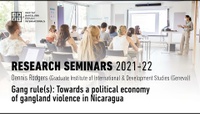Research Seminar | Gang rule(s): Towards a political economy of gangland violence in Nicaragua
Dennis Rodgers (Graduate Institute of International and Development Studies (Geneva)). Chair: Miriam Bradley (IBEI)
Available in video:
This presentation will explore the longitudinal dynamics of gang transformation in urban Nicaragua. It will begin by situating gangs within the country’s historic developmental trajectory before offering an overview of successive incarnations of gangs that have emerged over the past 30 years in barrio Luis Fanor Hernández, a poor neighbourhood in Managua, the capital city of Nicaragua, to identify conceptual and empirical building blocks towards developing a political economy of gangland violence. Drawing on Bourdieusian theory, it will then develop an analysis of the transformation of the barrio Luis Fanor Hernández gang by conceptualising it as a “social field” within which different forms of individual and collective capital accumulation emerge and interact with each other variably in order to shed light on the gang’s particular evolutionary trajectory.
Prior to joining the Graduate Institute of International and Development Studies in 2018, Dennis Rodgers held appointments at the Universities of Amsterdam, Glasgow, Manchester, and the London School of Economics and Political Science. His research focuses on issues relating to the dynamics of conflict and violence in cities in Latin America (Nicaragua, Argentina) and South Asia (India). Much of his work involves the longitudinal study of youth gangs in Nicaragua but he also works on the political economy of development, the politics of socio-spatial segregation, participatory governance processes, the historiography of urban theory, and the epistemology of development knowledge. In 2018 he was awarded a five-year European Research Council Advanced Grant for a project on “Gangs, Gangsters, and Ganglands: Towards a Comparative Global Ethnography” (GANGS), which aims to systematically compare gang dynamics in Nicaragua, South Africa and France.
|
*This activity has limited capacity. Registration is required to have a guaranteed seat and be able to attend the face-to-face modality. Virtual attendees will receive the access link by email.
|


